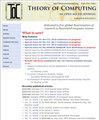顶点删除的硬度和项目调度
IF 0.7
4区 计算机科学
Q4 COMPUTER SCIENCE, THEORY & METHODS
引用次数: 28
摘要
假设唯一游戏猜想,我们证明了有向图上的两个自然顶点删除问题的强不可逼近性结果:对于任意整数k≥2和任意小e > 0,反馈顶点集问题和DAG顶点删除问题在k−e因子内是不可逼近的,即使在顶点几乎可以划分为k个解的图上也是如此。这为反馈顶点集问题提供了一个更结构化、更强大的基于ugc的硬度结果,它也比之前的硬度结果更简单(尽管使用了“It Ain 't Over until It 's Over”定理)。本文章由计算机程序翻译,如有差异,请以英文原文为准。
Hardness of Vertex Deletion and Project Scheduling
Assuming the Unique Games Conjecture, we show strong inapproximability results for two natural vertex deletion problems on directed graphs: for any integer k ≥ 2 and arbitrary small e > 0, the Feedback Vertex Set problem and the DAG Vertex Deletion problem are inapproximable within a factor k − e even on graphs where the vertices can be almost partitioned into k solutions. This gives a more structured and therefore stronger UGC-based hardness result for the Feedback Vertex Set problem that is also simpler (albeit using the “It Ain’t Over Till It’s Over” theorem) than the previous hardness result.
求助全文
通过发布文献求助,成功后即可免费获取论文全文。
去求助
来源期刊

Theory of Computing
Computer Science-Computational Theory and Mathematics
CiteScore
2.60
自引率
10.00%
发文量
23
期刊介绍:
"Theory of Computing" (ToC) is an online journal dedicated to the widest dissemination, free of charge, of research papers in theoretical computer science.
The journal does not differ from the best existing periodicals in its commitment to and method of peer review to ensure the highest quality. The scientific content of ToC is guaranteed by a world-class editorial board.
 求助内容:
求助内容: 应助结果提醒方式:
应助结果提醒方式:


